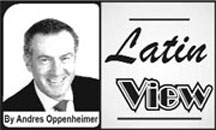When Pope Francis goes to Cuba in September, he will have a larger-than-usual influence over the Cuban government: he has been a champion of dialogue with the island’s regime and strong critic of the US trade embargo since he authored a little-known book on Cuba in 1998.
 The big question is whether Francis will use his clout to press Cuba to respect basic universal freedoms, or whether he will just make a symbolic stop on the island to celebrate the recent Vatican-brokered US-Cuba normalization talks.
The big question is whether Francis will use his clout to press Cuba to respect basic universal freedoms, or whether he will just make a symbolic stop on the island to celebrate the recent Vatican-brokered US-Cuba normalization talks.
Among the reasons why the Argentine-born Pope could—if he decides to do so—have more clout with the Cuban regime than previous popes and most other world leaders who have visited the island:
First, Francis was a key behind-the-scenes broker of the US-Cuban normalization talks first announced by President Barack Obama on Dec 17, after more than five decades of hostile relations.
While Washington and Havana had been holding secret normalization talks for many months, it was the Pope who helped break an impasse in the negotiations and move the process forward.
Francis received delegations from both countries in the Vatican in October. The negotiations led to a de facto prisoner swap between the two countries, and paved the way to discussions about reopening embassies in Washington and Havana.
Second, unlike his predecessors John Paul II and Benedict XVI, who visited the island respectively in 1998 and 2012, Francis has a long history of personal interest in Cuba. His book Dialogues between John Paul II and Fidel Castro, was published in Spanish in Argentina a few months after John Paul’s visit to Cuba in 1998.
I read most of the book this week, and—while it’s dense, and often difficult to read—it’s prophetic in that, much like Obama’s new policy toward Cuba, it called for a dialogue between Washington and Havana, and strongly criticized the US trade embargo on the island, calling it—using the Cuban government’s lingo—a “blockade.”
Also, Francis’ book stressed the Vatican’s criticism of what he called “capitalist neo-liberalism,” a code word for US-styled free-market policies. It is “a model that subordinates human beings and conditions the people’s development to pure market forces,” and that forces poor countries to “apply unsustainable economic programs dictated by the centers of power,” Francis wrote.
Third, the Argentine Pope will speak to the island’s rulers in their own language, and — as a Jesuit — he may find some childhood memories in common with Castro, who studied in a Jesuit school.
In addition, Pope Francis will benefit from strong support from the Cuban population: a poll conducted on the island by the US firm Bendixen & Amandi found that 80 per cent of Cubans have a positive opinion of Francis, the same as Obama’s. Comparatively, only 47 per cent of Cubans have a positive opinion of Raúl Castro.
Most likely, Pope Francis will use his considerable political capital in Cuba primarily to seek greater freedoms for Roman Catholic priests there. Right now, Cuban laws allow Roman Catholics to practice their religion within their churches, but not to spread their message through regular radio or television broadcasts.
“There is freedom of cult, but not freedom of religion, because priests cannot evangelize outside the walls of their churches,” says Froilán Dominguez, a former priest and seminary president in Cuba. “Pope Francis will have considerable leverage to ask for religious freedoms, such that to evangelize without government censorship.”
My opinion: If Francis doesn’t use his considerable leverage with the Cuban regime to speed up basic freedoms on the island, his visit will be a failure.
Just as John Paul obtained greater freedom for priests to work within their churches in Cuba, Francis should obtain absolute freedoms for them to work outside them. At the very least, if he doesn’t get the release of political prisoners or other basic human rights reforms, he should obtain regular Church broadcasts on Cuba’s state censored radio and television, or permission to create an independent radio or television network.
That might seem a small feat by world democratic standards, but it would allow most Cubans to hear a different message from the “Socialism or Death” nonsense they have been bombarded with for the past five decades. As an Argentine who himself lived through a dictatorship in the 1970s, Francis should be more sensitive than most to the need of opening up a space for independent media in Latin America’s last military dictatorship.








